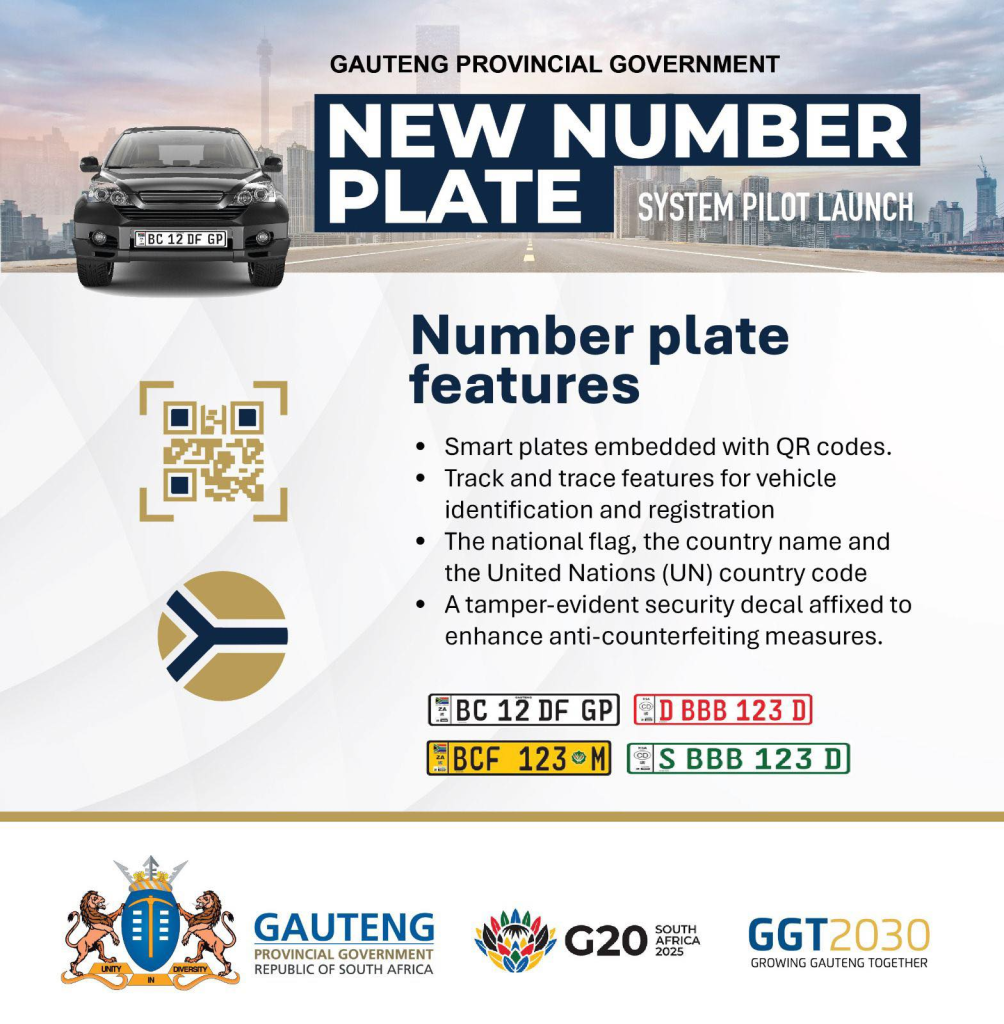New Gauteng Number Plates 2025: Everything You Need Before the Deadline

Gauteng has officially launched a new era in vehicle identification with the introduction of high-tech, tamper-proof number plates in 2025. The new number plates aim to combat vehicle theft, cloning, and fraudulent registrations while improving road safety and law enforcement effectiveness across the province. This article provides all the essential information Gauteng motorists need to prepare for the rollout and meet the compliance deadline.
RELEVANT ARTICLE: Numbers Don’t Lie: What Gauteng’s New Plates Mean for Crime Prevention
Table of contents
- Why Are New Number Plates Needed?
- Key Features of the New Number Plates
- The Digital Twin and Smart Tracking
- Pilot Phase and Public Rollout Schedule
- What Gauteng Vehicle Owners Need to Know
- Benefits for Motorists and the Community
- Addressing Public Concerns
- Legal Obligations and Enforcement
- Official Information and Support
Why Are New Number Plates Needed?
Vehicle crime in Gauteng is a serious challenge. Criminals often use cloned or fake number plates to commit crimes, evade law enforcement, and engage in illegal vehicle sales. The previous plates lacked adequate security features, allowing for widespread misuse.

The Gauteng provincial government’s new number plate system introduces cutting-edge technology to address these issues and restore order on the roads.
Key Features of the New Number Plates
- Tamper-Evident Decals: A special decal beneath the plate’s QR code self-destructs if tampered with, making illegal swapping or removal immediately obvious.
- Forensic QR Codes: Each number plate has a unique QR code linked to a secured digital database holding vehicle ownership and registration information. This enables quick verification by law enforcement agencies.
- Durable Aluminium Construction: Plates comply with the South African National Standards SANS:1116 for excellence in durability and visibility.
- Embedded Security Markings: Hidden forensic markings make plates identifiable, even if damaged or altered.
- National Symbols: The South African flag and “ZA” country code are prominently displayed for official recognition and cross-border interoperability.
The Digital Twin and Smart Tracking
The system uses digital twin technology, creating a precise digital replica of every physical number plate. This digital twin tracks the plate from manufacture to vehicle owner, providing transparent traceability throughout its lifecycle.
This innovation allows for real-time monitoring and prevents the use of fraudulent or cloned plates, significantly assisting crime prevention.
Pilot Phase and Public Rollout Schedule
The pilot phase began on 5 June 2025, with Gauteng’s government fleet vehicles (“G-Fleet”) fitted with the new plates for a six-month test period. The pilot aims to stress-test the system and ensure reliability before wider adoption.
Following successful implementation, a phased public rollout will commence, with all Gauteng motorists required to replace their old plates within the stipulated time frame.

What Gauteng Vehicle Owners Need to Know
- Stay Informed: Follow official updates from the Gauteng Department of Roads and Transport and licensing authorities.
- Prepare Financially: Replacing number plates involves cost, including new plates and re-registration fees. Budget accordingly.
- Update Vehicle Information: Ensure your vehicle details are accurate and up to date in the national registration database to avoid delays.
- Avoid Third-Party Scams: Use only official channels to order your new plates and do not pay unauthorized agents.
Benefits for Motorists and the Community
- Significant reduction in vehicle theft, cloning, and fraudulent activity.
- Enhanced ability for authorities to identify vehicles instantly via QR code scanning.
- Improved alignment with regional partners as the system supports interoperability across the Southern African Development Community (SADC) region.
- Greater confidence in vehicle legitimacy among buyers and insurers.
Addressing Public Concerns
Some citizens and organisations have expressed concerns about the financial impact and implementation logistics. Gauteng government leaders acknowledge these concerns but affirm that the security and safety benefits outweigh the short-term inconvenience and cost.
Public consultations and clear communication will continue to ensure transparency and smooth transition.
Legal Obligations and Enforcement
By law, all vehicles registered in Gauteng must comply with the new number plate standards by the official deadline. Failure to comply may lead to fines, vehicle impoundment, or other penalties.
The government is working with traffic law enforcement agencies, including the Road Traffic Management Corporation (RTMC) and metro police, to enforce compliance rigorously.
Official Information and Support
For updates and assistance, Gauteng residents should rely on:
- Gauteng Department of Roads and Transport official website and social channels
- Local licensing offices
- Official helpline services
Avoid unofficial providers to protect yourself from fraud or misinformation.




